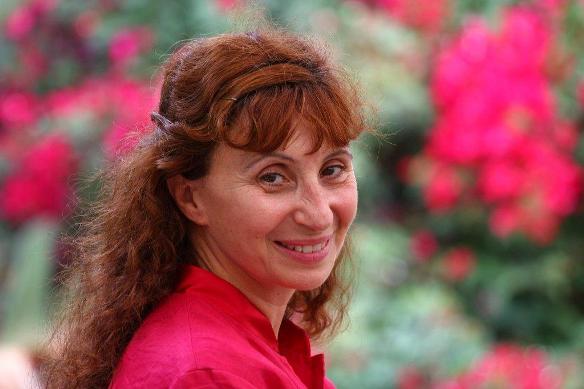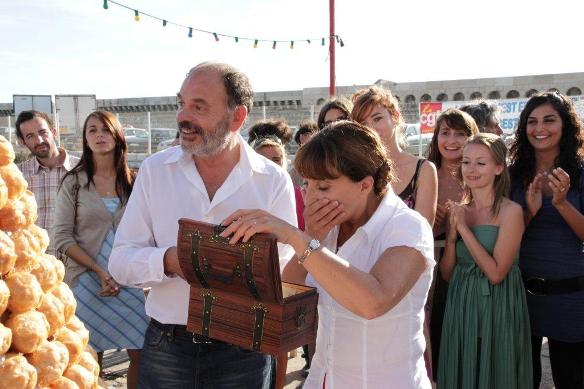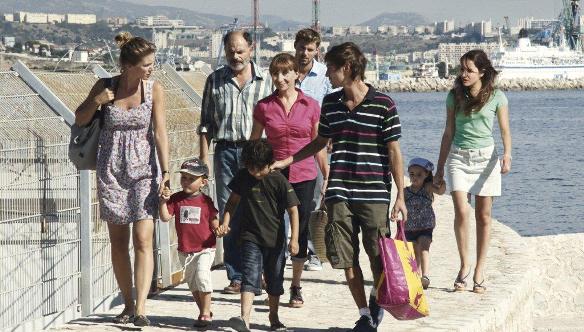“Time has passed, and the crisis is more severe,” French actress Ariane Ascaride commented on her most recent film, Les neiges du Kilimandjaro (The Snows of Kilimanjaro, France 2011), directed by Robert Guédiguian, which revisits the Marseilles working class setting of the film and life partner’s award winning film Marius et Jeannette (1997). Astride is the guest of the Haifa International Film Festival 2012, where the film participates in the Golden Anchor Competition, and was screened on October 2, 2012 as part of “Journée 100% Francophone” – a focus on French cinema sponsored by the French Institute and TV5 Monde.

Marie Claire (Ascaride) and her husband Michel (Jean-Pierre Daroussin) live a contented life within their means, enjoying their grown children and grandchildren; one might imagine them as a version of Marius and Jeanette several years down the road. Michel is a labor union rep for dockworkers, Marie Claire cares for the elderly, and somehow, over the past thirty years of hard work and a steady battle for worker’s rights, they have managed to own their own home and achieve a sense of stability, comfort and security. This serenity is disrupted in the film’s first scene: having reached a compromise to let go twenty dockworkers in order to save the jobs of the rest, Michel draws the names from a hat – one of them his own.
Michel attempts to cope with the unexpected early retirement, but another, more violent intrusion rends the fabric of their lives: they are robbed at gun point while playing cards in their home. Michel’s chance discovery of one of the thieves further unravels the ties that bind identity, family and friends, as Michel realizes that his Jaures-inspired struggles have fallen far short of achieving the better world he had imagined.
“The values that our generation has fought to conserve have not been transmitted to the younger generation,” said Astride, commenting on the protagonist’s dilemmas in the film, “They forgot to transmit these values…that is my generation. [Michel and Marie Claire] continue to live to behave as they did, but don’t realize that the world has changed.”
Astride said that the film reflects “the difficulty of living today in France. The younger generation have become more turned inward toward themselves, individualistic, or else others become more violent because life is so hard. The film tries to suggest what we should have done. Our values, the things we believe, were wonderful but…”
Yet neither Astride nor the film are content with bemoaning the loss of values and a generation that does not know Jaures. Reflecting on the situation of Michel and Marie-Claire in the film, she says, “they fought hard to preserve things, but there is another solution: to innovate, and that’s what we should do. Listen to the young.”

The film explores the current social-economic crisis and differences between the generations through a close look at the couple and their relationships. “The couple in the film know one another a long time,” said Astride, “it is about the life of a couple. There is a great deal of love, but also solidarity. She knows what he feels.”
Astride described Marie-Claire as a “woman who walks fast” explaining that in preparing for her role, she develops her characters from the shoes up. As an example, she pointed out that the red shoes she was wearing were from another role, in which she played a divorcee who dances and tosses her shoes in the air. Deciding what kind of shoes her character would wear, then letting the character work its way up to her mind, where the character’s life story grows in her mind. When asked if wearing the red shoes reveals an identification with the character, Astride replied, “It is something of me.” Yet the actress emphasized that it would be wrong to identify her entirely with the characters she has portrayed – women who are larger than life in their capacity for strength, compassion and wisdom, recalling with a laugh that in an interview on the film Marius et Jeannette, Guédiguian said, “Mois, je préfère Jeanette [I prefer Jeannette].”
When Marie-Claire comes home from work to find husband Michel sitting on the couch, staring into space, and a sink full of dishes, she doesn’t mince words, telling him: “You’re weak. Now that you don’t work and spend all day thinking you see you’re neither Jaures not Spiderman.” When I mentioned the scene to Astride, she smiled. “She knows she needs to make him angry. Some couples have a relationship ‘bien’ ‘bien’ – theirs is not like that,” she said, adding that strong women are a central element in the films of Guédiguian, “Robert has a lot of respect for women, and fear, he feels women are stronger than men.”
Astride and Guédiguian have been partners on and off screen for many years, but keep their home and work lives strictly separate. They do not discuss the film at home, and on set, says Astride, “I work with a director, not with my husband.”
Discussing Guédiguian the director, Astride said, “He does not direct, he speaks very rarely on the set. He believes that actors are also auteurs. He never holds auditions. When he chooses an actor for a role, he chooses the person. He watches many French films and observes the actors to see if there are actors whose work he likes who would fit the role in a particular film, and the working relationship is not just director-actor, it’s a relationship between two people.”
“If he is pleased with a scene, he says: ca va – OK, and if he is not pleased then he just says – take it from the beginning. He says: one does not direct a good actor, and working with him in this way implies a great responsibility for the actor.”
Astride’s own philosophy is that “It is not difficult to be a good actor, it is difficult to become the person. Just like a violinist, it’s not the technique that matters, it is the soul. We are not interested in virtuosity. I think that an actor is a thinking entity. I believe that as an actress I give the director the image in his mind but also bring something more, something that I put into the role – that is the work of an actor.”

Astride has worked in film with many directors, yet there is a unique quality to her work with Guédiguian, for the partnership extends to the entire team of actors and technicians, people who have worked together much like a theatre ensemble, for thirty years. Astride first met her co-star who plays Michel, at the Conservatoire where they were classmates. “At the beginning, I didn’t imagine it would turn out this way. It’s been a wonderful adventure. There was an homage to Robert at the cinematheque in Paris and I saw my entire life onscreen. We all feel proud to be working together for thirty years – it’s better than family, because we chose one another.”






This is awesome and inspiring. Thank you for your dedication and hard work. May blessings from God be upon you all.
Comments are closed.